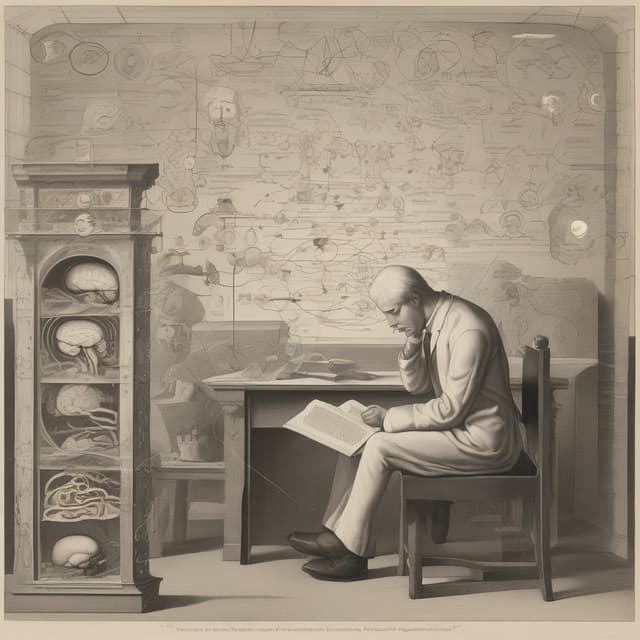
| Origins | Drew on philosophical ideas about the human mind and behavior |
| Emergence | During the Enlightenment era of the 17th and 18th centuries |
| Challenges | Faced significant opposition from traditional religious authorities |
| Connections | Closely intertwined with the development of neuroscience • Closely intertwined with the development of the social sciences • Closely intertwined with new modes of governance and social management |
| Early Approach | Sought to apply empirical observation and experimentation |
| Modern Development | Continues to evolve, with psychologists exploring an increasingly diverse range of topics and applications |
Psychology is the scientific study of the human mind and behavior. As a distinct field of inquiry, psychology has its origins in the Enlightenment philosophy and empirical traditions of the 17th and 18th centuries, predating the modern scientific discipline's establishment in the late 19th century. Spanning topics as diverse as cognition, emotion, perception, personality, and social interaction, psychology has developed a wide array of theories, methods, and practical applications over the course of its history.
Thinkers like René Descartes, John Locke, and Immanuel Kant established foundational philosophical ideas about the nature of the human mind, its relationship to the body, and the potential for systematic study of inner mental processes. Drawing on these Enlightenment principles, early pioneers of psychology sought to move beyond speculative philosophy and develop rigorous empirical approaches to understanding the workings of the mind.
Key figures in the emergence of psychology as a distinct science included Gottfried Wilhelm Leibniz, who proposed one of the first comprehensive theories of cognition, and Hermann von Helmholtz, whose groundbreaking research on sensory perception laid the foundations for the field. Franz Joseph Gall's work on phrenology also represented an early attempt to link specific mental faculties to distinct regions of the brain.
Parallel to the development of philosophical psychology, the 18th and 19th centuries saw rapid advances in the biological and neurological sciences that had profound implications for the study of the mind. Isaac Newton's mechanistic view of the physical world influenced new theories positioning the brain as a complex biological machine underlying human psychology.
Pioneers of this biological psychology approach included Luigi Galvani, whose discoveries about animal electricity paved the way for understanding the electrochemical basis of neural activity, and Charles Bell and François Magendie, who mapped the functions of the nervous system. These advances, combined with the rise of evolutionary theory, led to the emergence of physiological and neurological models of mental processes.
As the empirical study of human nature and behavior, psychology was closely intertwined with the concurrent rise of the social sciences. Psychologists drew on and contributed to the development of sociology, anthropology, economics, and political science, as well as new modes of governance and social management.
For instance, Wilhelm Wundt's laboratory experiments on sensation and perception were influential for the emerging field of experimental psychology, while Alfred Binet's work on intelligence testing was applied in educational and military contexts. Sigmund Freud's psychoanalysis also had a profound impact on the evolving social sciences' understanding of the human mind.
Beyond its scientific foundations, psychology has always maintained strong connections to philosophical questions about the nature of consciousness, free will, and the self. Psychologists have grappled with age-old debates about dualism versus materialism, the scope of rationality, and the roots of morality and ethics.
At the same time, the field has developed a wide range of practical applications, from clinical psychotherapy to human resource management to neuropsychology and forensic psychology. Psychologists' expertise in areas like learning, motivation, and social influence has also informed disciplines like education, marketing, and public policy.
Despite its growth and influence, psychology has faced significant skepticism and critique, particularly from traditionalist religious authorities who viewed the scientific study of the mind as a threat to established beliefs about the soul and human nature. Controversies have also arisen around issues of research ethics, the use of psychological testing, and the field's historical ties to eugenics and other problematic ideologies.
In the modern era, psychology has expanded into an increasingly diverse range of subspecialties, incorporating insights from fields like cognitive science, evolutionary psychology, and cultural psychology. Emerging research areas include digital psychology, positive psychology, and the neuroscience of consciousness. As the study of the mind and behavior grows ever more sophisticated, psychology continues to play a vital role in our understanding of what it means to be human.